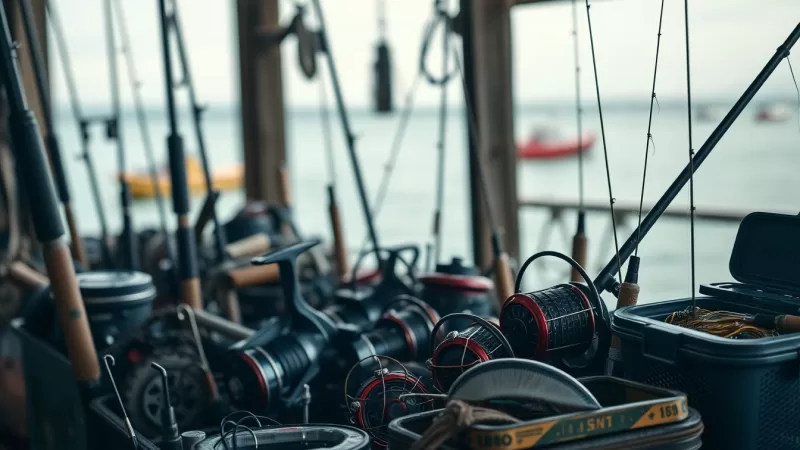Striper Fishing Gear: Essential Tools of the Trade

Remember that epic battle? Line screaming off the reel, muscles burning as you fought a monster striper near the bridge? That feeling is pure gold! But how often do anglers lose out on fish? It’s all too common. They’re using gear that isn’t up to the task. This guide will walk you through the essential striper fishing gear. With the right tools, you’ll maximize your success and land that trophy!
Rods: Choosing the Right Weapon for the Fight
Your rod is your primary weapon in the striper war. Rods are vital for casting distance and fighting power. Striper rods come in different lengths, powers, and actions. You need the right rod for the technique you’re using. Materials also play a big role in feel and performance.
Spinning Rods for Versatility
Spinning rods shine when casting lures and live bait. Their versatility makes them a striper angler’s best friend. The ideal spinning rod is 7-8 feet long with a medium to medium-heavy power rating. This combo lets you cast far and handle large fish. The moderate action is great for playing fish without pulling hooks.
Conventional Rods for Power
Conventional rods are built for trolling and heavier applications. They have the backbone to handle big stripers and heavy weights. Line capacity becomes important, too. You’ll need enough line to withstand long runs. Make sure the rod’s backbone can manage the pressure when fighting fish deep.
Reels: Power and Reliability Under Pressure
A reel is more than a line holder. Reels have to smoothly give and take when needed. It’s the engine that lets you retrieve line and battle fish. Spinning reels and conventional reels each have strengths. Consider line capacity, drag systems, and gear ratios.
Spinning Reels: Smoothness and Control
A smooth drag system is essential on spinning reels. It lets line out under pressure to prevent break-offs. Look for a reel in the 4000-6000 size range for striper fishing. A quality drag will give you the edge against hard-running fish. Reels must be durable.
Conventional Reels: Winches for Big Fish
Conventional reels are the winches of the striper world. They offer serious cranking power for trolling and deep jigging. Look for a level-wind system to evenly distribute line on the spool. Star drag systems are great for beginners, while lever drag systems offer more precise control. Select gear ratios based on trolling speeds. Slower gear ratios provide more power, while faster ones retrieve line quicker.
Lines and Leaders: The Unseen Connection
Your line is the link between you and the striper. It must be strong and abrasion-resistant. Monofilament, fluorocarbon, and braided lines all have a place. Leader materials add an extra layer of stealth and protection. Knot strength is crucial for preventing failures. Always tie good knots.
Monofilament: The Classic Choice
Monofilament is a classic choice for striper fishing because it is affordable and easy to use. It has good stretch, which can help absorb shocks. The downside is that it degrades in sunlight and has lower sensitivity than other options. Monofilament works well for trolling and live bait fishing in clear water.
Braided Line: Strength and Sensitivity
Braided line offers incredible strength and sensitivity. It allows you to feel even the most subtle strikes. Braid has no stretch. This is good for setting hooks at long distances. It can be expensive, though. Use a proper knot designed for braided line to prevent slippage.
Baits and Lures: Tempting Trophy Stripers
Baits and lures are your tools for attracting stripers. Live bait is hard to resist, while artificial lures let you cover water quickly. Master presentation techniques to get more bites. Experiment with different options to see what works best.
Live Bait: Irresistible Offerings
Live eels, bunker, and herring are top choices for stripers. They present a natural and enticing meal. Rig them using circle hooks to increase hook-up ratios. Use these live options to catch fish.
Artificial Lures: Matching the Hatch
Plugs, swimbaits, and jigs are great lures for striper fishing. Match the size, color, and action of the lure to the baitfish present. Vary your retrieve speed and depth to find what the stripers want. Keep a variety of lures on hand to adapt to changing conditions.
Electronics: Seeing What Lies Beneath
Electronics can greatly enhance your striper fishing success. Fish finders help you locate structure and fish. GPS units allow you to mark productive spots and navigate safely. These tools can help anglers find stripers.
Fish Finders: Unveiling Underwater Structure
Fish finders use sonar to create an image of what’s below your boat. Learn how to interpret the readings to identify fish, structure, and bait schools. Look for drop-offs, humps, and channels that may hold stripers. Side-scanning sonar can expand your search area.
GPS: Navigation and Spot Retention
GPS units let you mark waypoints on your favorite fishing spots. They also help you navigate in unfamiliar waters. Chartplotters combine GPS with detailed nautical charts. Depth finders show you the water depth.
Conclusion
The right striper fishing gear can make all the difference. Rods, reels, lines, lures, and electronics all play a part in your success. Invest in quality gear that matches your fishing style. Experiment with different techniques and presentations. There’s nothing like the thrill of hooking into a big striper. Make sure you’re equipped to handle the fight!

